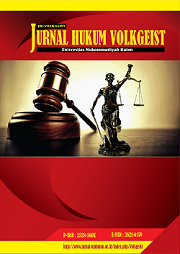The Resolution and Accountability of State Financial Loss In Administrative and Criminal Law Perspectives
DOI:
https://doi.org/10.35326/volkgeist.v8i1.4318Keywords:
State Financial Loss, Administrative Law, Criminal lawAbstract
Government officials, in performing public legal actions, may abuse their authority, resulting in financial loss to the state, which can have implications for both administrative and criminal resolution and liability. Purposes of this research, to determine and/or differentiate the resolution of financial loss to the state caused by the abuse of authority by government officials from administrative and criminal law perspectives, in order to avoid criminalizing government officials' actions and weakening the corruption eradication efforts. This research methods, this normative legal research applied a statute approach. The study findings indicate that the abuse of authority causing the state’s financial loss is primarily resolved under administrative law based on Law No. 30 of 2014 concerning Government Administration. This involves the return of the financial loss to the state or regional treasury and the imposition of severe administrative sanctions. However, the abuse of authority causing state financial loss can be treated as a criminal offense if the Internal Supervisory Apparatus (APIP) or law enforcement agencies find elements of a criminal offense as defined in Article 2 paragraph (1) or Article 3 of Law No. 31 of 1999.
Downloads
References
Adami Chazawi. (2014). Hukum Pidana Materil dan Formil Korupsi di Indonesia. Bayumedia Publising.
Ajawaila, S. V. H. and D. P. (2023). Korupsi Sebagai Kesalahan Administratif Yang Menimbulkan Kerugian Keuangan Negara. Jurnal Ilmiah Pendidikan Pancasila Dan Kewarganegaraan, 8(1), 87. https://doi.org/http://dx.doi.org/10.17977/um019v8i1p82-89
Barhamudin. (2019). Penyalahgunaan Kewenangan Pejabat Pemerintahan dan Ruang Lingkupnya Menurut Undang-Undang Administrasi Pemerintahan. Jurnal Solusi, 17(2), 176. https://doi.org/https://doi.org/10.36546/solusi.v17i2.171
Dinata, A. W. (2021). Implikasi hukum Ketidakpatuhan Terhadap Putusan Pengadilan Tata Usaha Negara Ditinjau Dari Pelaksanaan Otonomi Daerah dan Negara Kesatuan. Jurnal Hukum Peratun, 4(1), 8. https://doi.org/https://doi.org/10.25216/peratun.412021.1-30
Ernita Rahmadhani Bym, Andi Pangerang Moenta, Z. A. (2021). Supervision System for the Management of Regional Revenue and Expenditure Budgets in Makassar City. Jurnal Hukum Volkgeist, 6(1), 28. https://doi.org/https://doi.org/10.35326/volkgeist.v6i1.1391
Ilham. (2019). Criminal law policy about KPK authorities in the perspective of criminal action in corruption in Indonesia. Jurnal Hukum Volkgeist, 3(2), 144. https://doi.org/https://doi.org/10.35326/volkgeist.v3i2.125
Putusan Mahkamah Konstitusi Republik Indonesia Nomor 25/PUU/XIV/2016, 112 (2016).
Juliani, H. (2017). Penyelesaian Tuntutan Ganti Kerugian Negara/Daerah Terhadap Pegawai Negeri Bukan Bendahara dan Pejabat Lain. Jurnal Law Reform, 13(2), 247. https://doi.org/https://doi.org/10.14710/lr.v13i2.16158
Juliani, H. (2019). Akibat Hukum Penyalahgunaan Wewenang Administrasi Pejabat Pemerintahan yang Menimbulkan Kerugian Keuangan Negara. Adminitrative Law & Governance Journal, 2(4), 599. https://doi.org/https://doi.org/10.14710/alj.v2i4.598-614
Jupri, A.ST Kumala Ilyas, Suardi Rais, Rusmulyadi, S. (2022). The Role of the Saber Extortion Task Force (Sweeping Illegal Charges Task Force) in The Eradication of Criminal Actsof Corruption. Jurnal Hukum Volkgeist, 6(2), 187. https://doi.org/https://doi.org/10.35326/volkgeist.v6i2.2285
Lisa Ade Candra, Achmad Ruslan, M. A. (2022). The Authority of the State Audit Board in Managing State Finances as an Effort to Prevent Corruption. Jurnal Hukum Volkgeist, 7(1), 90. https://doi.org/https://doi.org/10.35326/volkgeist.v7i1.2810
M. Irsan Arief. (2022a). Banang merah Penyalahgunaan Kewenangan dan Diskresi Antara Hukum Administrasi dan Hukum Pidana Korupsi. Mekar Cipta Lestari.
M. Irsan Arief. (2022b). Pertanggungjawban Atas Kerugian Keuangan Negara Dalam Prespektif Hukum Administrasi, Perdata/Bisnis dan Pidana/Korupsi. Mekar Cipta Lestari.
Muhaimin. (2020). Metode Penelitian Hukum. Mataram University Press.
Nugraha, S. (2016). Konsep Penyalahgunaan Wewenang dalam Undang-Undang Tindak Pidana Korupsi di Indonesia. Jurnal Ilmu-Ilmu Sosial, 8(1), 18.
Panjaitan, M. J. (2017). Penyelesaian Penyalahgunaan Wewenang yang Menimbulkan Kerugian Negara Menurut Hukum Administrasi Pemerintahan. Jurnal Hukum Ius Ouia Iustum, 24(3), 443. https://doi.org/10.20885/iustum.vol24.iss3.art5
Rais, S. (2019). Audit of state losses by the Gorontalo attorney general in a corruption case. Jurnal Hukum Volkgeist, 3(2), 105. https://doi.org/https://doi.org/10.35326/volkgeist.v3i2.120
Ridwan HR. (2010). Hukum Administrasi Negara. PT. Raja Grafindo Persada.
Shinta Agustina, Roni Saputra, Alex Argo Hernowo, A. E. S. (2016). Penafsiran Unsur Melawan Hukum Dalam Pasal 2 Undang-Undang Pemberantasan Tindak Pidana Korupsi. LeIP.
Suhendar and Kartomo. (2020). Kerugian Keuangan Negara Telaah Dalam Prespektif Hukum Administrasi Negara dan Hukum Pidana. Jurnal Surya Kencana Satu, 11(2), 240. https://doi.org/http://dx.doi.org/10.32493/jdmhkdmhk.v11i2.8048
Tjandra, W. R. (2014). Hukum Keuangan Negara. PT Gramedia Widiasarana Indonesia.
Trisna, R. M. and W. (2021). Penentuan Kerugian Keuangan Negara Akibat Penyalahgunaan Kewenangan Pejabat Pemerintahan. Jurnal Ilmiah Penegakan Hukum, 8(2), 177. https://doi.org/http://dx.doi.org/10.31289/jiph.v8i2.5811
Downloads
Submitted
Accepted
Published
Issue
Section
License
Copyright (c) 2023 Muhamad Aksan Akbar

This work is licensed under a Creative Commons Attribution-ShareAlike 4.0 International License.
- Author retains the copyright and grants Jurnal Hukum Volkgeist the right of first publication of the work simultaneously licensed under the Creative Commons Attribution-ShareAlike 4.0 License that allows others to share the work with an acknowledgment of the work's authorship and initial publication in this journal
- The author is able to enter into separate, additional contractual arrangements for the non-exclusive distribution of the journal's published version of the work (e.g., post it to an institutional repository or publish it in a book) with the acknowledgment of its initial publication in this journal.
- The author is permitted and encouraged to post his/her work online (e.g., in institutional repositories or on their website) prior to and during the submission process, as it can lead to productive exchanges, as well as earlier and greater citation of the published work (See The Effect of Open Access).









.png)































